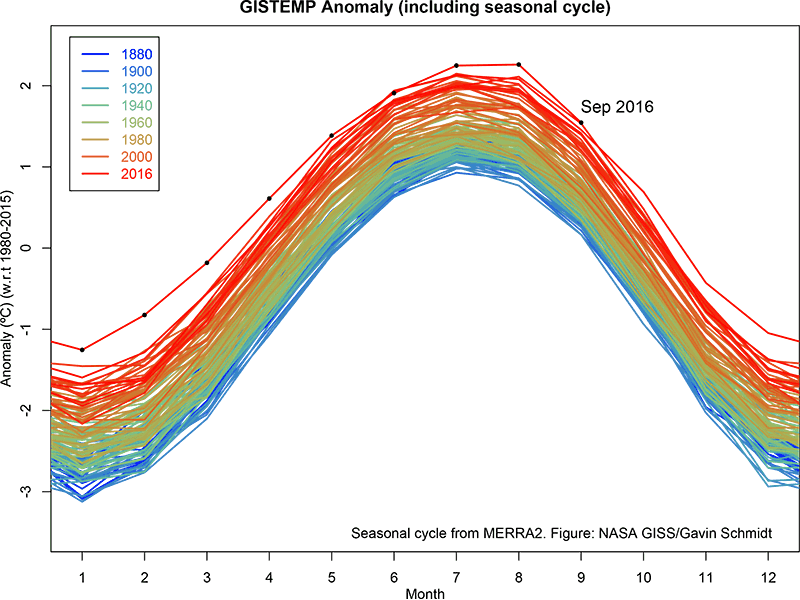It’s only October, but that doesn’t seem to matter: NASA is basically sure 2016 will go down as the hottest year in recorded history. Unless a rogue planet suddenly appears to fling the Earth off its present orbit and into the Kuiper Belt, we’re locked in. Welcome to life in a rapidly warming world.
Map of the September 2016 Land Ocean temperature anomaly. Image: NASA/GISS
This probably won’t come as a surprise to those who’ve been keeping up with our record smashingly-long streak of record-smashingly-hot months. All the way back in May, Goddard Institute for Space Studies (GISS) director Gavin Schmidt was saying there’s a 99 per cent chance that 2016 will set a new global heat record, thanks to a sweltering winter aggravated by the pool of hot water stretching across the equatorial Pacific, better known as El Niño.
Now, El Niño has left us and its climate-oscillation counterpart, La Niña, is on its way in. But, like college kids at a free beer event, the records just won’t stop coming. July, typically one of the warmest months of the year, hit a new all-time high for global heat, clocking in at 0.84 degrees Celsius hotter than NASA’s baseline record (1951 to 1980). It was swiftly tied, perhaps surpassed, by August.
Now, the GISS data from September is out, and — surprise! — another month for the record books. Although not an all time high, last month was the hottest September in 136 years of record keeping, 0.91 degrees Celsius above the baseline period average. (It’s worth noting, however, that September 2016 out-cooked September 2014 by a razor-thin margin, just 0.004 degrees.)
More important than the fact that we’ve added yet another month to our global hot streak — we’ve now had roughly a dozen such records in as many months, depending on whose data you look at — is what the latest numbers means for 2016 as a whole. Schmidt, who has become something of our global temperature ambassador, took to Twitter yesterday to revise his previous expectation. Without saying the word “definitely,” because again, rogue planets and chaos, he’s as sure as a scientist can be that 2016 will be another hottest year.
With data now available through September, 2016 annual record (~1.25ºC above late 19th C) seems locked in. pic.twitter.com/Btp3Vutakn
— Gavin Schmidt (@ClimateOfGavin) October 17, 2016
Looking out a bit further, 2017 is unlikely to see a global temperature record. “I don’t think we’ll necessarily see 1.25 degrees next year,” Boston College climate scientist Jeremy Shakun told Gizmodo, noting that our recent El Niño event was a major contributor to this year’s temperature spike. “Nonetheless,” he added, “the important thing is the long-term warming trend.”
Indeed, a 1.25 degrees warmed world means we’ve got precious little wiggle room before we hit the Paris climate agreement’s first major goal, of limiting global warming to 1.5 degrees Celsius. As Shakun, along with former GISS director James Hansen and others wrote in a recent paper, that goal probably isn’t feasible without as-yet-uninvented carbon capture technology.

Mostly temperature anomalies against a baseline period from 1951-1980. Image: NASA/GISS/Schmidt
In related news, the Mauna Loa climate observatory’s atmospheric CO2 record now seems to have permanently crossed the 400 ppm threshold, a threshold the modern world hit for the very first time in 2013. Three million years ago — the last time there was this much carbon in the atmosphere — global sea levels were 19.81m higher and trees skirted the North Pole. To find the last time the rate of carbon emissions was this high, you have to go back to the extinction of the dinosaurs, or even further.
“The bottom line, to me, is unassailable,” Shakun said. “With emissions continuing at the rate they’re going a little while longer, I see no way to argue that we aren’t handing off plenty of climate impacts to future generations.”
